Charles William Sutton – A Victorian Chemist
When we think of a Victorian Chemist’s shop we visualise large glass carboys in the window, filled with impressive coloured liquids of unspecified purpose or benefit, and the rows of ceramic storage jars inscribed with the reassuringly obscure Latin names of their pharmaceutical contents, behind an equally reassuring mahogany counter – and perhaps a jar of leeches. The equipment would include a mortar and pestle or two and delicately balance scales with a precise set of weights for weighing out the prescription ingredients. Physicians of the period will have treated those patients who could afford their services with blood-letting, powerful purgatives and cathartics, while for the poor their chief recourse may have been simply to the advice of the local chemist with his home-manufactured (and sometimes notorious) ‘Pills, Powders and Potions’. There was still little control over the manufacture and sale of ‘Patent Medicines’ while the claims of their efficacy would become ever more extravagant and unsubstantiated. Some benefit was derived however from the use of cocaine, quinine, and digitalis and even (in small quantities!) arsenic, all of which could be bought freely across the counter without prescription. Laudanum (tincture of opium) was recommended for colds and as a painkiller[1]. Where the passing trade was limited, chemist shops often stocked a wider range of goods to increase footfall and turnover.
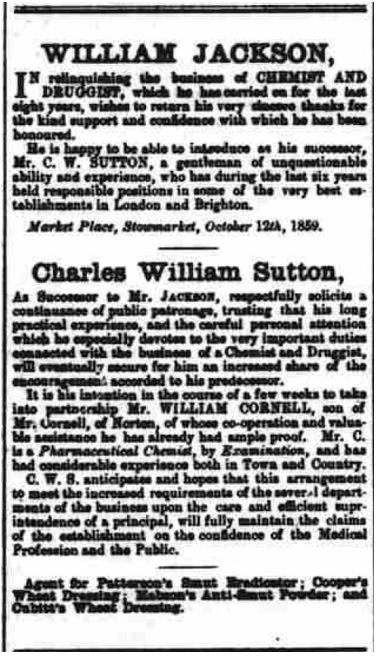
In 1859 Charles William Sutton of Louth, Lincolnshire, aged 25, and pharmacist “by examination”, came to Stowmarket[2]. He had served his pharmaceutical apprenticeship with Thomas Nettleship in Lincoln[3]. He bought the chemists shop in Stowmarket town centre from William Jackson, situated on the corner where Ipswich Street joins Market Place. In the convention of the time the vendor duly commended his successor to his clientele, particularly as Mr Sutton was to take into partnership another qualified chemist, a local man, William Cornell[4].
Over the next 10 years Mr Sutton became well established in the Stowmarket community and the business continued to thrive. He became a local councillor, auditor of the local Provident Society, and he was regularly seen at the social and commercial events of the town with other leading figures. In December 1859 he was inducted into the Stowmarket (Phoenix) Freemasons Lodge.
He started to advertise in the local press, modestly at first[5]:
Note for those of a certain generation: Whatever happened to chilblains?
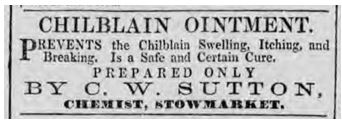
Living at the business premises in 1861 his household included his maternal aunt Maria Ellwood, and in addition to William Cornell, his business partner, there was Thomas Wilson, his ‘chemist’s apprentice’ from Newark, Nottinghamshire. Later, in April that year Sutton married Susan Renshaw b.1839, who came from his home town of Louth, Lincolnshire. Over the next twelve years they would have 5 children and would continue to live at the business address.
In 1866 Robert Bobby (1828-1887) of Crownland Farm House, Walsham Le Willows, a farmer of 50 acres, married Susannah Cross, widow. She had been married to William Cross[6] who was the Walsham le Willows “Chemist and Druggist”[7], but he had died in 1861. She had then carried on his business to the best of her ability. Sadly she died a year after her marriage to Mr Bobby following the birth of their daughter Susannah, in April 1867[8]. Bobby decided to sell the business which was obviously outside his area of expertise. The stocking policy for the chemists shop had become somewhat unfocussed as Mrs Cross had diversified into selling Fancy Goods and, among other things, knitting wool, stationery and children’s toys. An advertisement appeared saying that the shop was being sold to Mr Sutton of Stowmarket who would however be concentrating on the core pharmacy business and therefore the other stock was to be immediately sold off before the new owner took over[9].
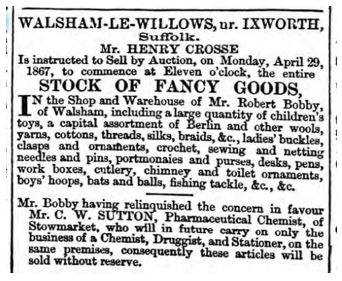
Having bought the business in Walsham Mr Sutton immediately appointed Mr Wilson who had been apprenticed to him seven years previously, as his local manager, in premises in what was then called Church Street, next to John Nash (grocer and draper), and that would subsequently be known today as The Old Post Office. In addition to the principal Chemists business he did in fact retain the Stationery side and it was in that role that he sold the sheet music to service the local concert performers mentioned in an earlier Review[10]. He also sold newspapers and magazines.
He set about establishing his presence and developing his reputation in Walsham as well as Stowmarket and most weeks he advertised in the local newspapers. A few examples follow:
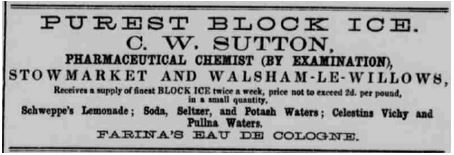
He developed his range of stock to meet local needs. This included health drinks and eau de cologne for summer refreshment, both internally and externally! In the second half of the 19th century[11] while mechanical refrigeration was still being developed block ice was widely imported to England from Norway and also from the Great Lakes of North America[12]. Despite the ‘happy onomatopoeic coincidence’ of the name Schweppes for an effervescent drink, the origin is in the name of Jacob Schweppe, a German jeweller. He started the manufacture of artificial mineral waters in Geneva in 1780 before coming to England in 1798 to establish his business there[13]. Great esteem was also attached to natural mineral waters with an exotic European cachet[14].
Mr Sutton catered both for the domestic and agricultural markets[15] offering an impressive range of preparations for the treatment of both farm animals and arable crops:
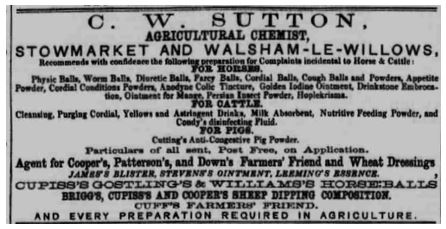
The ‘Sutton’s Royal Osborne’ Brand, which he sold with suitably majestic overtones, extended to an eclectic mix of food sauces, furniture cream and non-poisonous silver polish[16].
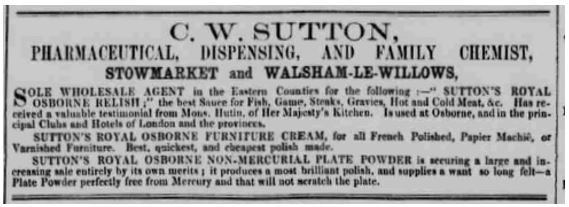
For the equine market he provided benefit for a wide range of conditions[17]…
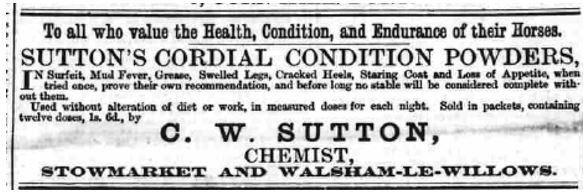
….and for other members of the household he offered ‘Perfumery in all its Branches’[18].

As part of the local Walsham community Charles Sutton, in the winter of 1869 gave a lengthy and detailed lecture at the Walsham Public Hall (under the chairmanship of Mr Miller, the local brewer) on “Fermentation, with application to the process of making wine, beer, spirits etc.” This “instructive and interesting” lecture included a practical demonstration of distilling a quantity of spirits from “Mr Miller’s strongest ale”. The lecture “was prefaced and supplemented with some excellent songs given by Dr Short and Mr Francis, sen.”[19] .
His brief direct involvement with the village however came to an end the following year when, in 1870, the Walsham business was sold on to Mr Wilson in his own right[20].
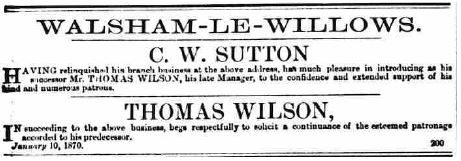
This coincided with Sutton’s purchase of a residence for his family in Stowupland. They later moved to Stonham Earl in a household with a number of servants where the 1881 census described him as a chemical manufacturer. By then he had also sold the Stowmarket pharmacy to Wilson who having run the Walsham business for some years[21] sold it on to Arthur Harrington of Needham Market. Harrington would also subsequently establish the Walsham Post Office in the same premises[22].
Charles William Sutton died in 1887 and his estate was valued for probate purposes at the equivalent of £1.6 million.
Joseph McCann
December 2018
Note: All newspaper cuttings courtesy of British Newspaper Archive/British Library
References
[1] The 1868 Pharmacy Act simply restricted opium sales to the pharmacist’s shop, with the Act requiring pharmacists to keep records of the purchasers. Further restrictive legislation did not come until 1908 and later.
[2] b. 1834, Louth, Lincolnshire, son of George Sutton ‘druggist’.
[3] Magistrate and Chemist, Lincoln
[4] BURY FREE PRESS Saturday 29th October 1859
[5] The Ipswich Journal 15th November 1862
[6] Susannah Land, married William Cross, Sudbury, June 1858. They had one child, William Henry Cross b.1859
[7] Whites Directory 1855
[8] Robert Bobby subsequently married (1870) another widow, Lucy Copeland nee Vine (1821-1896) . His daughter Susannah Jane Bobby (1867-1955) grew up in Walsham and married Peter Robert Nunn (1868-1941), farmer and “steam-driven thrashing-machine owner”. They had eight daughters and one son.
[9]BURY AND NORWICH POST Tuesday 23rd April 1867
[10] Doctor Kent Review No.80 October 2017
[11] GANTZ, Carroll: Refrigeration: A History, McFarland & Company, Inc.(2015)
[12] The Ipswich Journal Saturday 15th June 1867
[13] ROOM, Adrian: Dictionary of Trade Name Origins, Routledge & Kegan Paul (1982)
[14] Seltzer water is properly a medicinal mineral water from Nieder-Selters in Germany. Celestine is one of the original six springs at the Vichy Spa in France. Pullna water (Bitterwasser) came from another small German village.
[15]The Ipswich Journal 15th July 1867 and 28th September 1867
[16] The Ipswich Journal 30th November 1867
[17] Bury and Norwich Post Tuesday 17th March 1868
[18] Bury Free Press 30th May 1868
[19] NORWICH MERCURY Saturday 30th January 1869.
[20] Bury Free Press 29th January 1870
[21] Kelly’s Directory 1879
[22]Kelly’s Directory 1896:”Harrington Arthur, pharmaceutical chemist, stationer & agent for W. & A. Gilbey Limited, wine & spirit merchants, Post Office.”

